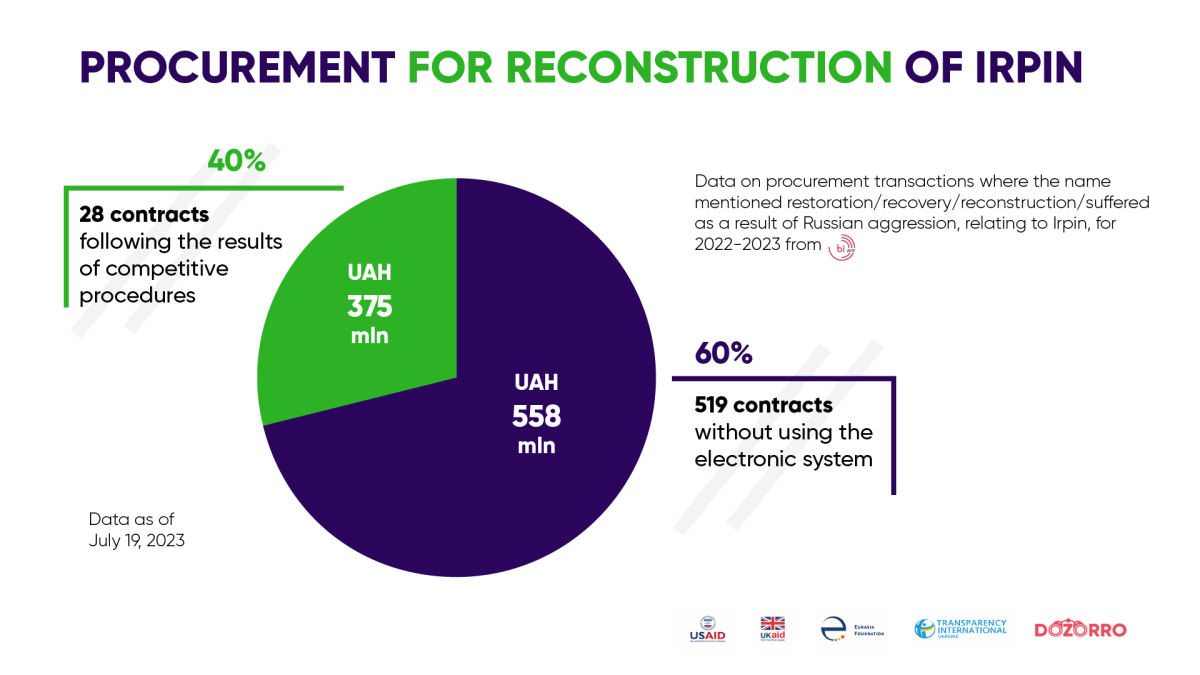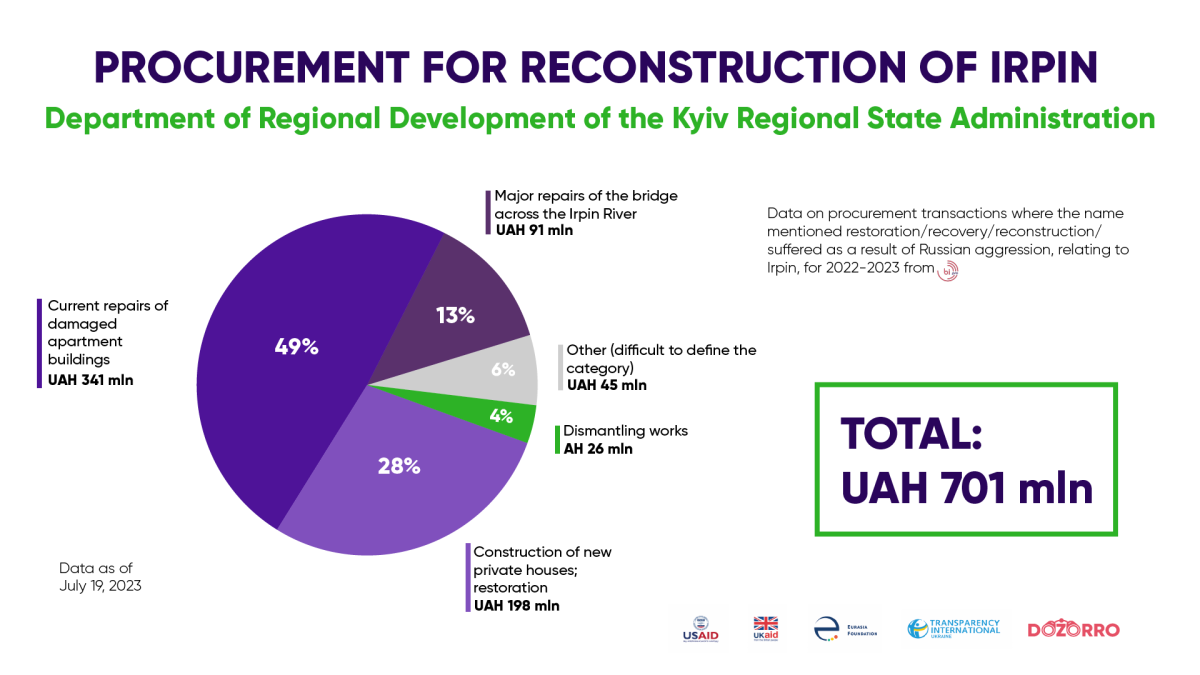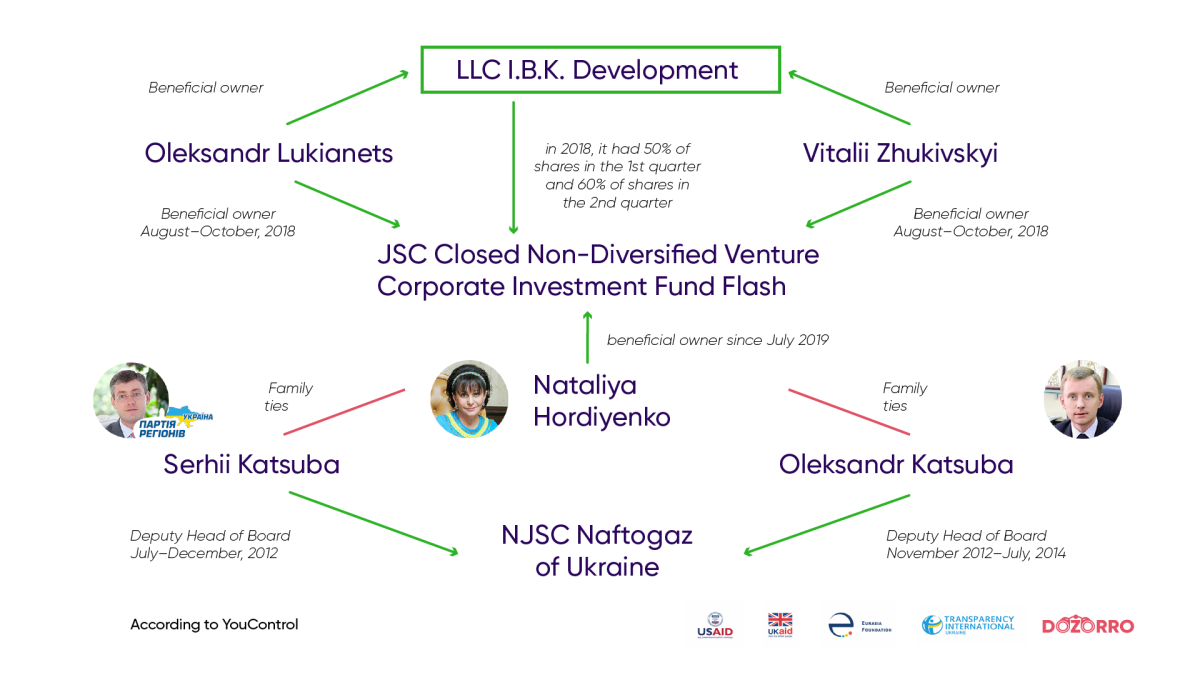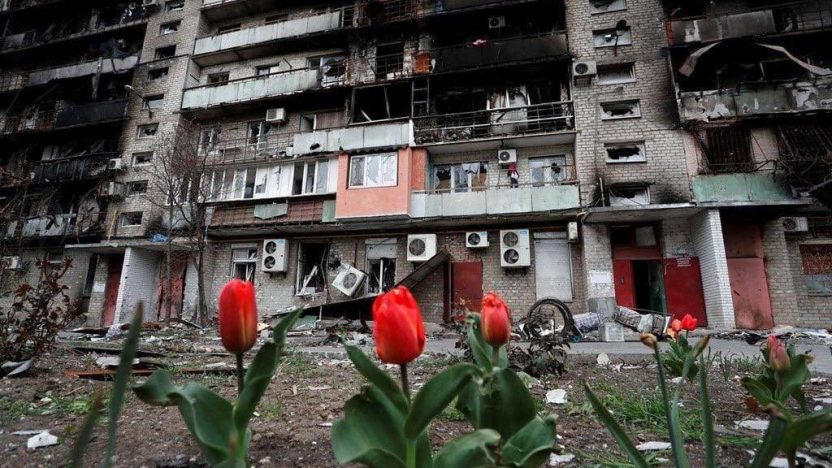

Reconstruction of Irpin after the destruction caused by russia can cost about a billion dollars. This was reported by Volodymyr Karpliuk, chair of the Investment Council of the city in April 2022, with reference to the calculations of experts and accountants whom the council engaged in the restoration of the destroyed or damaged housing stock.
Part of the costs have already been covered by such organizations as UNICEF, Terre des Hommes Italy, IOM Ukraine, Open Door Ukraine, IOCC, Adra Ukraine, UNDP, NEFCO, the Government of Japan, the Lithuanian Demolition Association. Thus, according to the Irpin Recovery Fund, as of the beginning of May 2023, 412 apartment buildings and 322 private houses in the Irpin community received reconstruction assistance.
Currently, the institutions of the Irpin City Council, the specialized oblast department, and the Kyiv Oblast Reconstruction Service have signed agreements related to the reconstruction of the city for UAH 933 mln. In this material, the DOZORRO project of Transparency International Ukraine analyzes what these funds should be used for and who will receive them.
Who buys what?
We selected all procurement transactions where the name mentioned restoration, recovery, reconstruction, and the phrase “suffered as a result of Russian aggression” relating to Irpin. Information on such agreements for UAH 933 mln is available on Prozorro for 2022-2023. The largest number of such tenders was announced by the Department of Regional Development of the Kyiv Regional State Administration — for UAH 701 mln. The Executive Committee of the Irpin City Council comes second — UAH 198 mln. The Infrastructure Restoration and Development Service in Kyiv Oblast comes third (UAH 19 mln).
Out of 547 contracts, only 28 were concluded as a result of competitive procedures. Their value is UAH 375 mln, that is, 40%. The rest of the procurement transactions were carried out without the use of Prozorro. Effectively, contractors were mostly selected independently, without competitive bidding.
The Department of Regional Development of the Kyiv Regional State Administration conducted procurement for the reconstruction of Irpin for at least UAH 701 mln. Most of the funds spent accounted for the repair of damaged apartment buildings — UAH 341 mln. The restoration and construction of new private houses (UAH 198 mln) come second.
The Executive Committee of the Irpin City Council concluded such agreements for UAH 198 mln. Most of the funds spent accounted for construction materials (UAH 63 mln), repair of residential buildings (UAH 40 mln), and dismantling works (UAH 37 mln).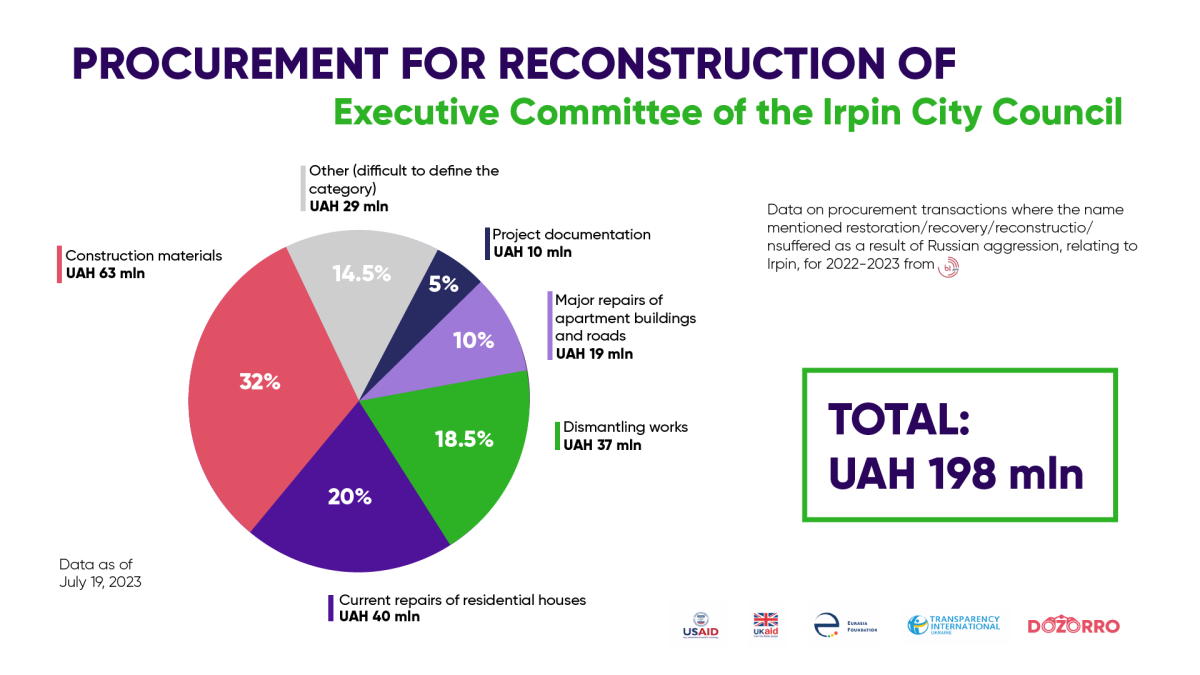
The Infrastructure Restoration and Development Service in Kyiv Oblast concluded agreements for the reconstruction of Irpin for UAH 19 mln. All contracts are for repairs and construction of bridges across the Irpin River.
Suspicious companies to be paid more than UAH 400 mln
UAH 434 mln — that is, almost half of the amount of all contracts for the reconstruction of Irpin — will be given to six companies that have a suspicious background. Their beneficiaries may be associated with pro-Russian party members; companies similar to clones of state-owned enterprises have repeatedly come to the attention of law enforcement officers.
Ties with Party of Regions members
The undisputed leader in the procurement of reconstruction in Irpin is LLC I. B.K. Development from Kyiv, with UAH 135 mln. It is a favorite of the Department of Regional Development of the Kyiv Regional State Administration. By tradition, it has been repeatedly involved in criminal proceedings.
One of the latter concerns major repairs in the premises of the National University of Life and Environmental Sciences of Ukraine in Kyiv, which I.B.K. Development did not fulfil, but for which it received UAH 30 mln. In addition, in 2019, police investigators suspected the company’s participation in providing kickbacks to the heads of the Department of Regional Development of the Kyiv Regional State Administration. In the 4 years of the investigation, the proceedings on the alleged embezzlement of hundreds of millions of hryvnias were limited to serving the inspector of the Department with charges, as well as the head of one of the firms involved — not I. B.K. Development.
In 2018, investigators suspected the company of fictitious entrepreneurship and securities fraud, and in 2017 — of overstating the volume of works performed.
Until September 2018, two co-owners of this company, Oleksandr Lukianets and Vitalii Zhukivskyi, were also beneficiaries of JSC Closed Non-Diversified Venture Corporate Investment Fund Flash. The owner of the latter is Nataliia Hordiienko, the mother of Serhii Katsuba, MP of the 7th convocation from the Party of Regions, and Oleksandr Katsuba, the former Deputy Chair of the Board of NJSC Naftogaz of Ukraine. Both were suspected of involvement in the procurement of the so-called Boiko Towers, purchased at twice the price (USD 400 mln each).
A company suspected of collusion and budget embezzlement
Contracts for UAH 81 mln were signed with LLC BK Kyiv-M-Bud. This construction company was opened in 2016; the beneficiaries were then Vitalii Shevchuk from Rivne and LLC Norex Group, which specialized in computer repair.
In 2017, the beneficiaries of the company were Kyiv residents Vitalii Nedashkivskyi and Oleh Maksymenko, as well as Vitalii Moskovych from Cherkasy Oblast. Within a few months, BK Kyiv-M-Bud began to receive orders from the Department of Housing and Municipal Services and Construction of the Pechersk District Council of Kyiv and became the most popular contractor of the institution, even despite the fact that the Department of Internal Financial Control and Audit of the Kyiv City Council found violations that had led to losses of almost UAH 60,000. As of July 23, 2023, the district Department of Housing and Municipal Services concluded agreements with the company for more than UAH 80 mln.
Over the past 5 years, Oleh Maksymenko was replaced by Hennadii Buzayev in the list of founders, a Kyiv resident, who, until 2019, was an individual entrepreneur with taxi being the main type of his activity.
In addition to the change of owners, the company became the subject of investigations in criminal proceedings regarding the possible overestimation of the volume of the works performed, the alleged misappropriation of budget funds and their waste, as well as collusion with other participants of tenders.
In particular, within the framework of the last proceedings, the investigators noted that LLC BK Kyiv-M-Bud and LLC VM-Stroi participated in the auctions of tenders and submitted reports from the same IP address. The common nature of these companies was also pointed out by one of the former employees of BK Kyiv-M-Bud in an anonymous negative review.
A twin of a state enterprise of the Defense Ministry
Irpin City Council and Kyiv RMA plan to pay UAH 78.4 mln to LLC 703 Metalworking Plant of Boiler Equipment. The company, which specializes in the production of radiators and central heating boilers, was registered in 2009 by Mykola Vakhnin and his son Yevhen. At that time, Mykola Vakhnin still headed an eponymous state-owned enterprise of the Ministry of Defense.
According to YouControl, Mykola Vakhnin was the director of the state enterprise of the Defense Ministry 703 Metalworking Plant of Boiler Equipment from 2005 to 2011. During this period, in May 2009, together with his son, he opened an eponymous company and at the same address as the state enterprise, even with the same main type of activity.
According to the journalists of Nashi Groshi, with reference to the Public Procurement Bulletin, while Vakhnin headed the SE 703 Metalworking Plant of Boiler Equipment, it received orders for construction works for almost UAH 14 mln. After the registration of the clone company, the state-owned enterprise was not awarded in a single tender.
Instead, Vakhnin’s private LLC 703 Metalworking Plant of Boiler Equipment received state orders for almost UAH 22 mln for the same period (2008-2011). After the launch of Prozorro, the situation has not changed. The private company of the former head of the SOE, since 2017, has received 91 contracts for UAH 532 mln, while the state-owned enterprise — none.
Moreover, the company has its functioning website, available only in Russian.
Company suspected of money laundering
Lviv developer LLC Makroecobud received an order for another UAH 65.8 mln. This company was registered in 2015 in Kyiv for a resident of Dnipropetrovsk Oblast, Vadym Buhaitsov. In 2017, the owners were Khmelnytskyi residents Yevhen and Halyna Hordiyevych. In 2021, Makroecobud was re-registered in Lviv, and Yevhen Hordiyevych withdrew from the beneficiaries.
Instead, the bild.ua portal notes that the company was established in 2010 and managed to build the Familia and Halytskyi Lion residential complexes; it is also building the Resident Hall complex.
During the company’s work, it was involved in several investigations into the theft of materials during construction, as well as the use of conversion centers. Clients of such centers conclude fictitious contracts with companies to perform works or provide services that in reality do not take place. Receiving money for them and returning them to counterparties, these companies help launder illegally obtained funds. For this, the organizers and controllers of such companies take a percentage of the converted amount.
Previously, Makroecobud almost did not work with procuring entities on Prozorro. In 2021, the company concluded a contract for the cleaning of the Trostianets riverbed in the city of Horodok in Khmelnytskyi Oblast for UAH 5 mln, and now — for the reconstruction of a high-rise building in Irpin for UAH 65.8 mln.
Contract for the works already performed
UAH 49.5 mln is to be paid to LLC Construction Company Dismantler from Irpin. The company has already received UAH 2.9 mln for the dismantling of the five-story building on 12, 14-16 Hostomel highway. The contract with the contractor was signed on October 28 — after the Irpin City Council reported on the completion of the relevant works.
This publication was prepared with the support of the USAID/UK aid project “Transparency and Accountability in Public Administration and Services / TAPAS”.




